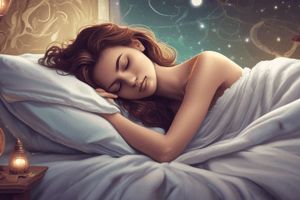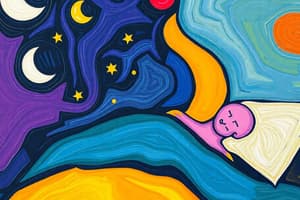Podcast
Questions and Answers
Which of these stages are part of NREM sleep? (Select all that apply)
Which of these stages are part of NREM sleep? (Select all that apply)
- REM sleep
- Stage 1 (correct)
- Stage 3 (correct)
- Stage 2 (correct)
What characterizes REM sleep?
What characterizes REM sleep?
Rapid eye movements, increased brain activity, vivid dreams, and muscle paralysis.
A full sleep cycle typically lasts around 90-120 minutes.
A full sleep cycle typically lasts around 90-120 minutes.
True (A)
List two functions of sleep.
List two functions of sleep.
Which of the following is not considered a sleep disorder?
Which of the following is not considered a sleep disorder?
To improve sleep, it is recommended to avoid ______ activities before bedtime.
To improve sleep, it is recommended to avoid ______ activities before bedtime.
What is a common symptom of Narcolepsy?
What is a common symptom of Narcolepsy?
Match the sleep disorder with its characteristic:
Match the sleep disorder with its characteristic:
Flashcards are hidden until you start studying
Study Notes
Stages of Sleep
Sleep consists of two main stages: Non-Rapid Eye Movement (NREM) and Rapid Eye Movement (REM) sleep.
NREM Sleep
- Divided into three stages:
- Stage 1: Transition from wakefulness to sleep, characterized by slow eye movements and a decrease in body temperature.
- Stage 2: Body temperature cools, heart rate slows, and body prepares for deeper sleep.
- Stage 3: Deep sleep, also known as slow-wave sleep, where brain waves slow down significantly.
REM Sleep
- Characterized by:
- Rapid eye movements
- Increased brain activity, similar to when awake
- Vivid dreams
- Paralysis of the muscles to prevent acting out dreams
Sleep Cycles
- A full sleep cycle typically lasts around 90-120 minutes
- Each cycle consists of NREM stages 1-3, followed by REM sleep
- Most people experience 4-6 sleep cycles per night
Functions of Sleep
- Memory Consolidation: Sleep helps process and strengthen memories
- Physical Restoration: Sleep gives the body a chance to repair and regenerate tissues, build bone and muscle, and strengthen the immune system
- Hormone Regulation: Sleep influences the balance of various hormones, including insulin, growth hormone, and hormones that regulate appetite and metabolism
- Emotional Well-being: Sleep helps regulate emotions and reduce stress
Sleep Disorders
- Insomnia: Difficulty initiating or maintaining sleep
- Sleep Apnea: Pauses in breathing during sleep
- Narcolepsy: Excessive daytime sleepiness and sudden attacks of sleep
- Restless Leg Syndrome: Uncomfortable sensations in the legs during sleep
Tips for Improving Sleep
- Establish a Consistent Sleep Schedule
- Create a Sleep-Conducive Environment (dark, quiet, cool)
- Avoid Stimulating Activities Before Bedtime
- Avoid Caffeine and Electronics Before Bedtime
- Exercise Regularly, But Not Before Bedtime
Stages of Sleep
- NREM (Non-Rapid Eye Movement) sleep is divided into three stages:
- Stage 1: transition from wakefulness to sleep, slow eye movements, and decreased body temperature
- Stage 2: body temperature cools, heart rate slows, and body prepares for deeper sleep
- Stage 3: deep sleep (slow-wave sleep), brain waves slow down significantly
- REM (Rapid Eye Movement) sleep is characterized by:
- Rapid eye movements
- Increased brain activity (similar to when awake)
- Vivid dreams
- Paralysis of muscles to prevent acting out dreams
Sleep Cycles
- A full sleep cycle typically lasts 90-120 minutes
- Each cycle consists of NREM stages 1-3, followed by REM sleep
- Most people experience 4-6 sleep cycles per night
Functions of Sleep
- Memory Consolidation: process and strengthen memories
- Physical Restoration: repair and regenerate tissues, build bone and muscle, and strengthen immune system
- Hormone Regulation: influence balance of various hormones (insulin, growth hormone, appetite and metabolism hormones)
- Emotional Well-being: regulate emotions and reduce stress
Sleep Disorders
- Insomnia: difficulty initiating or maintaining sleep
- Sleep Apnea: pauses in breathing during sleep
- Narcolepsy: excessive daytime sleepiness and sudden attacks of sleep
- Restless Leg Syndrome: uncomfortable sensations in legs during sleep
Tips for Improving Sleep
- Establish a Consistent Sleep Schedule
- Create a Sleep-Conducive Environment (dark, quiet, cool)
- Avoid Stimulating Activities Before Bedtime
- Avoid Caffeine and Electronics Before Bedtime
- Exercise Regularly, But Not Before Bedtime
Studying That Suits You
Use AI to generate personalized quizzes and flashcards to suit your learning preferences.




